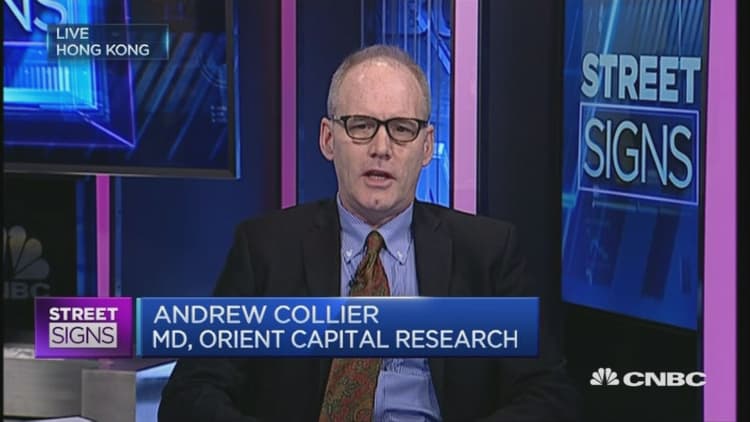China's economy has managed a curiously singular feat for any country: Growing a steady rate of 6.7 percent for the third quarter in a row.
"It's definitely unusual in an international context," noted Julian Evans-Pritchard, a China economist at Capital Economics on Wednesday. "There are almost no countries that have such stable GDP growth rates."
The GDP trifecta is the first since at least 1992 when Reuters began compiling data.
"It suggests quite significant smoothing of the data behind the scenes. Even by Chinese standards, this is quite rare," Evans-Pritchard said.
China's economic data routinely face market scepticism over accuracy, so it's not terribly surprising that the release Wednesday of gross domestic product (GDP) data showing the third quarter's economic growth kept an even keel for a third quarter – in line with forecasts and smack in the middle of the government's 6.5-7.0 percent target range – would also spur scrutiny.
Evans-Pritchard noted that the steady reports likely reflected that growth this year has stabilized somewhat in the world's second-largest economy.
He noted that the slowdown earlier this year likely wasn't fully reflected in the official figures.
"There's incentive for the statistics bureau to take advantage of [the underlying recovery] to bring the official figures closer in line with reality," he said. "It's a question of reversing the previous distortions."
In a note on Wednesday, Evans-Pritchard lowered his forecast for official GDP growth for this year to 6.7 percent from 6.8 percent.

Evans-Pritchard wasn't alone in noting the stability of China's data.
"In China, these numbers don't tend to bounce around a lot. They tend to be remarkably smooth," said Louis Kuijs, head of Asia economics at Oxford Economics.
"The authorities feel so strongly about the GDP numbers that the whole government apparatus are always doing everything they can, especially in terms of policies and stimulating growth to make sure that the activity numbers, the economic growth numbers are pretty close to what it's targeting."
Kuijs said he viewed the focus on meeting the 6.5-7.0 percent economic growth target as a setback.
He noted that last year, high-level policymakers had indicated that it would be acceptable to miss growth targets, but then late in 2015, the government returned to a rigid interpretation.
"Many economists find that unfortunate," Kuijs said. "If you have organic growth in your economy of around 5.5 percent in a context of a pretty subdued global economy, if you continue to insist of 6.5 percent growth, that means you have to rely on rapid credit growth and other macro-economic stimulus to achieve it."
China's economy has been expected to slow as the mainland transitions from manufacturing-led growth toward consumption. Concerns have persisted over the mainland economy's health, as private-sector debt has surged even as the amount of growth from additional debt has declined.
What lies ahead for China's economic growth?
Suan Teck Kin, an economist at Singapore-based UOB, has what may be an unsurprising forecast for the fourth quarter:
"We do not expect China's full year growth in 2016 to deviate significantly from our forecast of 6.7 percent, and this means that fourth-quarter GDP growth is likely to come in at similar pace of 6.7 percent," he said in a note on Wednesday.
—By CNBC.Com's Leslie Shaffer; Follow her on Twitter @LeslieShaffer1


